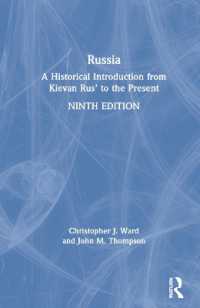- ホーム
- > 洋書
- > 英文書
- > Philosophy
Full Description
Jean-Luc Marion has long endeavored to broaden our view of truth. In this illuminating new book—his deepest engagement with theology to date—Marion proposes a rigorous new understanding of human and divine revelation in a deeply phenomenological key.
Although today considered the central theme of theology, the concept of Revelation was almost entirely unknown to the first millennium of Christian thought. In a penetrating historical deconstruction, Marion traces the development of this term to the rise of metaphysics from Aquinas through Suárez, Descartes, and Kant; formalized into an epistemological framework, this understanding of Revelation has restricted philosophical and theological thinking ever since. To break free from these limits, Marion takes hints from theologians including Barth and Balthasar while mobilizing the phenomenology of givenness to provide a rigorous new understanding of revelation as a mode of uncovering. His extensive study of the Jewish and Christian Scriptures unfolds a logic of Trinitarian phenomenality, worked out in conversation with Basil, Augustine, Hegel, Schelling, and others, that ultimately transforms our very notions of being and time.
The result is precisely what we have come to expect from this acclaimed philosopher: masterful historical scholarship working in tandem with daring originality.
Contents
Translators' Note
Introduction by Stephanie Rumpza
Foreword
Part I
Envoy
1. The Privilege of a Question
2. The Privilege of a Notion: Revelation
Part II: The Constitution of the Aporia
3. Thomas Aquinas and the Epistemological Interpretation
4. Suarez and the Sufficiency of the Proposition
5. The Magisterium's Reserve
6. The Metaphysical Origin of the Common Concept of Revelation
Part III: The Restitution of a Theological Concept
7. The Possibilities and the Aporias of a Theological Concept of Revelation
8. Unconcealment or Uncovering
9. Ista revelatio, ipsa est attractio
10. The Other Logic and Its Determinations
Part IV: Christ as Phenomenon
11. Nobody's Manifestation
12. What the "Mystery" Uncovers (Paul)
13. Parable and Confession (the Synoptics)
14. The "Mystery"—of Whom? (John)
Part V: The Icon of the Invisible
15. Monotheism and Trinity: An Ontic Model
16. Immanence and Economy: A Historical Model
17. The Trinity as Icon: A Phenomenal Model
18. The Trinity as the Phenomenality of the Gift
Part VI: The Opening
19. Being, Uncovered from Elsewhere
20. Time, Uncovered from Elsewhere
Notes
Index








